| Listing 1 - 10 of 21 | << page >> |
Sort by
|
Book
ISBN: 9782503547770 250354777X 250354827X Year: 2015 Volume: 27 Publisher: Turnhout: Brepols,
Abstract | Keywords | Export | Availability | Bookmark
 Loading...
Loading...Choose an application
- Reference Manager
- EndNote
- RefWorks (Direct export to RefWorks)
Medieval rhetoric --- Middeleeuwse retorica --- Retorica [Middeleeuwse ] --- Rhetoric [Medieval ] --- Rhétorique médiévale --- Rhetoric, Medieval --- Camargo, Martin --- Festschriften --- Literature [Medieval ] --- History and criticism
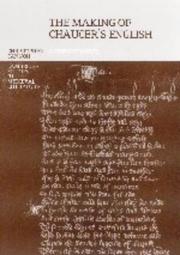
ISBN: 0521592747 Year: 1998 Volume: 39 Publisher: Cambridge ; New York, NY : Cambridge University Press,
Abstract | Keywords | Export | Availability | Bookmark
 Loading...
Loading...Choose an application
- Reference Manager
- EndNote
- RefWorks (Direct export to RefWorks)
Medieval rhetoric --- Middeleeuwse retorica --- Retorica [Middeleeuwse ] --- Rhetoric [Medieval ] --- Rhétorique médiévale --- English language --- Rhetoric, Medieval. --- Etymology. --- Glossaries, vocabularies, etc. --- Lexicology. --- Chaucer, Geoffrey --- Language --- Middle English, 1100-1500 --- Lexicology --- Etymology --- Glossaries, vocabularies, etc --- CHAUCER (GEOFFREY), d. 1400 --- LANGUAGE
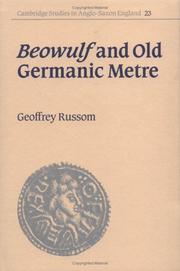
ISBN: 0521593409 0521093090 0511582986 0511002793 Year: 1998 Volume: 23 Publisher: Cambridge : Cambridge university press,
Abstract | Keywords | Export | Availability | Bookmark
 Loading...
Loading...Choose an application
- Reference Manager
- EndNote
- RefWorks (Direct export to RefWorks)
Alliteration. --- Civilization, Anglo-Saxon. --- English language --- Germanic languages --- Rhetoric, Medieval. --- Rhythm. --- Versification. --- Alliteratie --- Alliteration --- Allitération --- Angelsaksische beschaving --- Angelsaksische cultuur --- Anglo-Saxon civilization --- Beschaving [Angelsaksische ] --- Civilisation anglo-saxonne --- Civilization [Anglo-Saxon ] --- Cultuur [Angelsaksische ] --- Medieval rhetoric --- Middeleeuwse retorica --- Retorica [Middeleeuwse ] --- Rhetoric [Medieval ] --- Rhétorique médiévale --- Beowulf --- Versification --- Old English, ca. 450-1100 --- Rhythm --- Beowulf - Versification. --- English language - Old English, ca. 450-1100 - Rhythm. --- Germanic languages - Versification. --- Arts and Humanities --- Literature --- BEOWULF --- ENGLISH LANGUAGE --- ANGLO-SAXON CIVILIZATION --- MEDIEVAL RHETORIC --- ALLITERATION --- ALTHOCHDEUTSCHE LITERATUR --- VERSIFICATION --- OLD ENGLISH --- RHYTHM --- HILDEBRANDSLIED
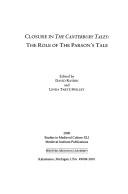
ISBN: 1580440118 1580440126 Year: 2000 Volume: 41 Publisher: New York, NY : Western Michigan university,
Abstract | Keywords | Export | Availability | Bookmark
 Loading...
Loading...Choose an application
- Reference Manager
- EndNote
- RefWorks (Direct export to RefWorks)
Berouw in de literatuur --- Clergy in literature --- Clergé dans la littérature --- Clerus in de literatuur --- Closure (Rhetoric) --- Conclusion (Rhétorique) --- Endings (Rhetoric) --- Last lines (Rhetoric) --- Medieval rhetoric --- Middeleeuwse retorica --- Peroratie --- Peroration --- Péché dans la littérature --- Péroration --- Repentance in literature --- Repentir dans la littérature --- Retorica [Middeleeuwse ] --- Rhetoric [Medieval ] --- Rhétorique médiévale --- Sin in literature --- Slot (Retoriek) --- Zonde in de literatuur --- Chaucer, Geoffrey --- Repentance --- Christianity --- History of doctrines --- Middle Ages, 600-1500 --- Christianity and literature --- England --- History --- To 1500 --- Technique --- Religion --- Middle Ages, 500-1500 --- CHAUCER (GEOFFREY), d. 1400 --- CHRISTIANITY IN LITERATURE --- MEDIEVAL RHETORIC --- SIN IN LITERATURE --- CANTERBURY TALES
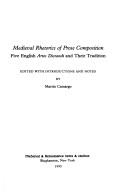
ISBN: 0866981683 Year: 1995 Volume: 115 Publisher: Binghamton ; New York Medieval & Renaissance Texts & Studies
Abstract | Keywords | Export | Availability | Bookmark
 Loading...
Loading...Choose an application
- Reference Manager
- EndNote
- RefWorks (Direct export to RefWorks)
Medieval rhetoric --- Middeleeuwse retorica --- Retorica [Middeleeuwse ] --- Rhetoric [Medieval ] --- Rhétorique médiévale --- 82-5 --- 82.085 --- 091:82-5 --- Rhetoric, Medieval --- Redevoering. Preek --- Retorica. Argumentatieleer. Voordrachtkunst --- Handschriftenkunde. Handschriftencatalogi-:-Redevoering. Preek --- 091:82-5 Handschriftenkunde. Handschriftencatalogi-:-Redevoering. Preek --- 82.085 Retorica. Argumentatieleer. Voordrachtkunst --- 82-5 Redevoering. Preek --- 82-5 Oratory. Speeches. Sermons. Addresses. Lectures. Others --- Oratory. Speeches. Sermons. Addresses. Lectures. Others
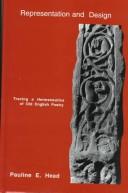
ISBN: 0791432041 Year: 1997 Volume: *2 Publisher: Albany State University of New York Press
Abstract | Keywords | Export | Availability | Bookmark
 Loading...
Loading...Choose an application
- Reference Manager
- EndNote
- RefWorks (Direct export to RefWorks)
Esthétique de la réception --- Hermeneutics --- Hermeneutiek --- Herméneutique --- Medieval rhetoric --- Middeleeuwse retorica --- Mimesis in de literatuur --- Mimesis in literature --- Mimêsis dans la littérature --- Reader-response criticism --- Representation (Literature) --- Représentation (Littérature) --- Retorica [Middeleeuwse ] --- Rhetoric [Medieval ] --- Rhétorique médiévale --- Voorstelling (Literatuur) --- English literature --- Old English, ca. 450-1100 --- History and criticism --- Theory, etc. --- Authors and readers --- England --- History
Book
ISBN: 9789042931749 9782758402268 9042931744 2758402262 Year: 2015 Volume: 10 Publisher: Leuven : Peeters,
Abstract | Keywords | Export | Availability | Bookmark
 Loading...
Loading...Choose an application
- Reference Manager
- EndNote
- RefWorks (Direct export to RefWorks)
"Seventeen previously published papers, here updated and revised, and one hitherto unpublished essay explore the medieval notion of the Seven Deadly Sins and several aspects of medieval sermons"--Cover page 4.
Christian pastoral theology --- Christian dogmatics --- anno 500-1499 --- France --- England --- Medieval rhetoric --- Middeleeuwse retorica --- Retorica [Middeleeuwse ] --- Rhetoric [Medieval ] --- Rhétorique médiévale --- Deadly sins. --- Sermons --- Deadly sins --- Sermons, Medieval. --- Péchés capitaux --- Sermons médiévaux --- History of doctrines --- Histoire des doctrines --- Péchés capitaux --- Sermons médiévaux --- Middle Ages, 600-1500 --- Sermons [Medieval ] --- History and criticism --- Sermons [Latin ] --- Preaching --- History --- Theology [Doctrinal ] --- Theology --- Middle Ages, 500-1500
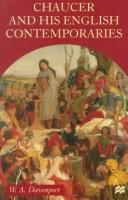
ISBN: 0333601327 0333601319 Year: 1998 Publisher: New York, NY : MacMillan,
Abstract | Keywords | Export | Availability | Bookmark
 Loading...
Loading...Choose an application
- Reference Manager
- EndNote
- RefWorks (Direct export to RefWorks)
Art de conter en litterature --- Christelijke bedevaarders en bedevaarten in de literatuur --- Christian pilgrims and pilgrimages in literature --- Medieval rhetoric --- Middeleeuwse retorica --- Pèlerins et pèlerinages chrétiens dans la littérature --- Retorica [Middeleeuwse ] --- Rhetoric [Medieval ] --- Rhétorique médiévale --- Storytelling in literature --- Vertelkunst in de literatuur --- Chaucer, Geoffrey --- English poetry --- Middle English, 1100-1500 --- History and criticism --- Experimental poetry [English ] --- Tales [Medieval ] --- Chaucer, Geoffrey, - d. 1400. - Canterbury tales. --- Experimental poetry, English - History and criticism. --- CHAUCER (GEOFFREY), d. 1400 --- CANTERBURY TALES
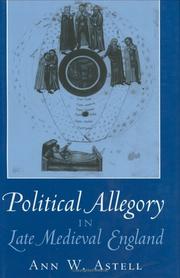
ISBN: 0801435609 0801474655 Year: 1999 Publisher: Ithaca : Cornell University Press,
Abstract | Keywords | Export | Availability | Bookmark
 Loading...
Loading...Choose an application
- Reference Manager
- EndNote
- RefWorks (Direct export to RefWorks)
Ann W. Astell here affords a radically new understanding of the rhetorical nature of allegorical poetry in the late Middle Ages. She shows that major English writers of that era-among them, William Langland, John Gower, Geoffrey Chaucer, and the Gawain-poet-offered in their works of fiction timely commentary on current events and public issues. Poems previously regarded as only vaguely political in their subject matter are seen by Astell to be highly detailed and specific in their veiled historical references, implied audiences, and admonitions. Astell begins by describing the Augustinian and Boethian rhetorical principles involved in the invention of allegory. She then compares literary and historical treatments of key events in fourteenth- and fifteenth-century England, finding an astonishing match of allusions and code words, especially those deriving from puns, titles, heraldic devices, and personal cognizances, as well as repeated proverbs, prophecies, and exempla. Among the works she discusses are John Ball's Letters and parts of Piers Plowman, which she presents as two examples of allegorical literature associated with the Peasants' Revolution of 1381; Gower's allegorical representation of the Merciless Parliament of 1388 in Confessio Amantis; and Chaucer's brilliant literary handling of key events in the reign of Richard II. In addition Astell argues for a precise dating of Sir Gawain and the Green Knight between 1397 and 1399 and decodes the work as a political allegory.
Allegorie --- Allegory --- Allégorie --- Inventio (Retorica) --- Invention (Rhetoric) --- Invention (Rhétorique) --- Medieval rhetoric --- Middeleeuwse retorica --- Retorica [Middeleeuwse ] --- Rhetoric [Medieval ] --- Rhétorique médiévale --- English literature --- Political poetry, English (Middle) --- Politics and literature --- Rhetoric, Medieval. --- Allegory. --- Personification in literature --- Symbolism in literature --- Rhetoric --- English political poetry, Middle --- Middle English political poetry --- Political poetry, English --- Political poetry, Middle English --- English poetry --- History and criticism. --- History --- Great Britain --- Politics and government --- Rhetoric, Medieval --- History and criticism --- Middle English, 1100-1500 --- Political poetry [English ] (Middle) --- To 1500 --- 1154-1399 --- 1399-1485
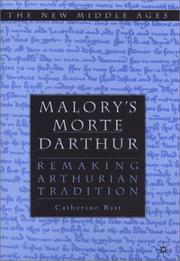
ISBN: 0312229984 9780312229986 Year: 2002 Volume: *4 Publisher: New York Basingstoke : Palgrave,
Abstract | Keywords | Export | Availability | Bookmark
 Loading...
Loading...Choose an application
- Reference Manager
- EndNote
- RefWorks (Direct export to RefWorks)
This study innovatively explores how Malory's Morte D'Arthur responds to available literary vernacular Arthurian traditions which the French defined as theoretical in impulse, the English as performative and experimental. Negotiating these influences, Malory transforms constructions of masculine heroism, especially in the presentation of Launcelot, and exposes the tensions and disillusions of the Arthurian project. The Morte poignantly conveys a desire for integrity in narrative and subject-matter, but at the same time tests literary conceptualizations of history, nationalism, gender and selfhood, and considers the failures of social and legal institutionalizations of violence, in a critique of literary form and of social order.
Chevaliers et chevalerie dans la littérature --- Kings and rulers in literature --- Knights and knighthood in literature --- Koningen en heersers in de literatuur --- Medieval rhetoric --- Middeleeuwse retorica --- Narration (Rhetoric) --- Narration (Rhétorique) --- Narrative writing --- Retorica [Middeleeuwse ] --- Rhetoric [Medieval ] --- Rhétorique médiévale --- Ridders en ridderschap in de literatuur --- Rois et souverains dans la littérature --- Verhaal (Retoriek) --- Malory, Thomas --- Arthurian romances --- History and criticism --- Romances [English ] --- Malory, Thomas (1408?-1471). Le morte Darthur --- Chevalerie --- Rois et souverains --- Dans la littérature
| Listing 1 - 10 of 21 | << page >> |
Sort by
|

 Search
Search Feedback
Feedback About UniCat
About UniCat  Help
Help News
News